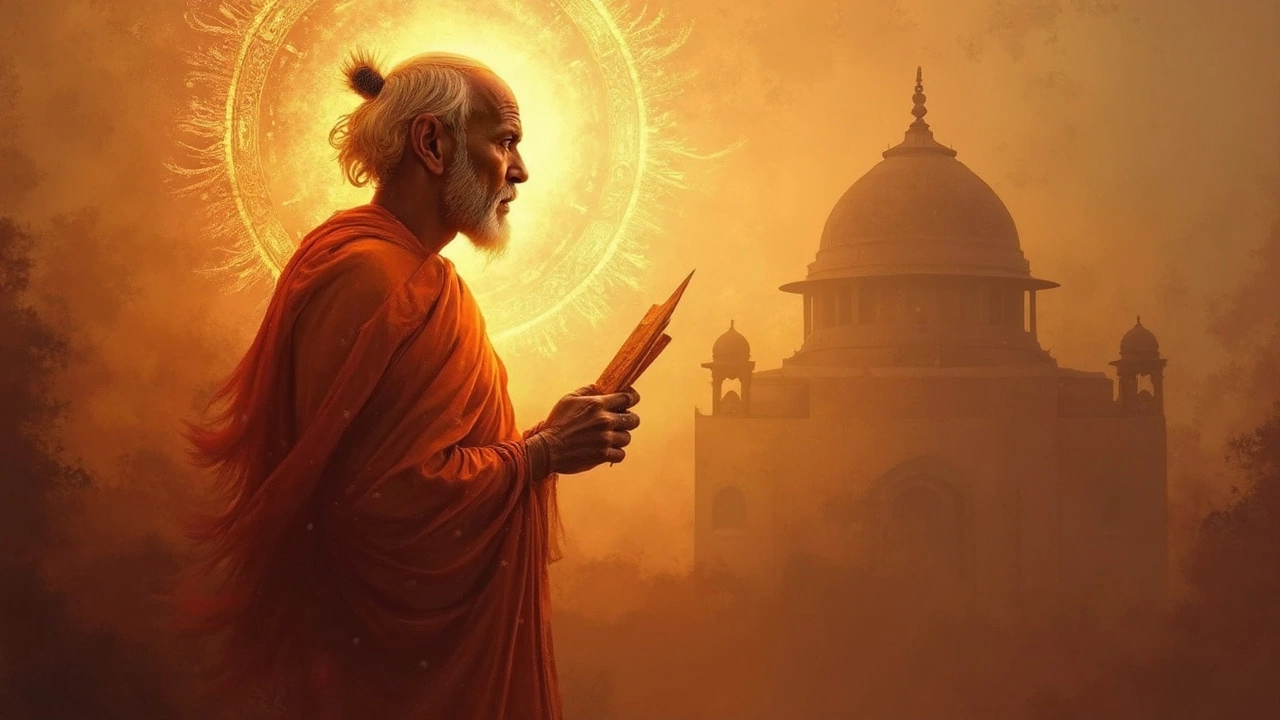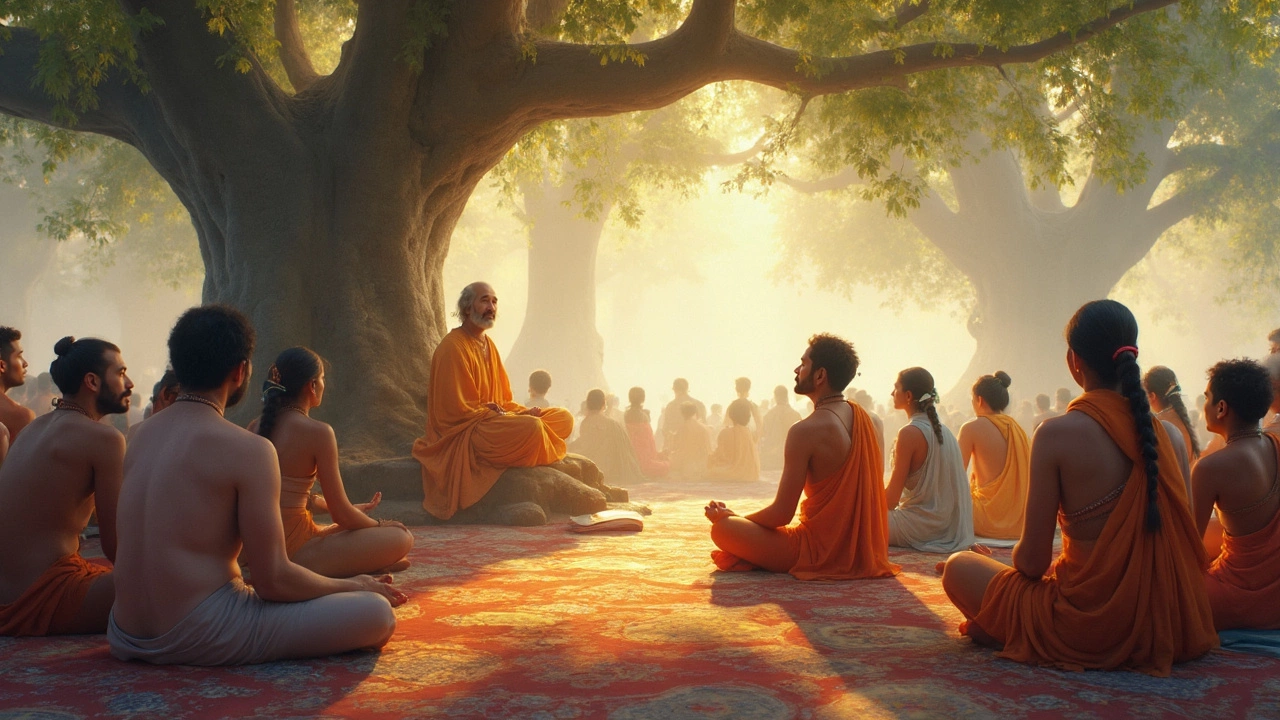When you ask someone about the most powerful post in India, most will say it's the Prime Minister or maybe the President. But ask around in families, listen to what elders say, and you’ll notice something else: in India, true power often comes from spiritual leaders. Ever wondered why millions line up for a blessing from a guru, even though he holds no office?
Spiritual power here isn't about authority or rules. It's about influence—the kind that reaches into homes, hearts, and even WhatsApp forwards. Think of spiritual quotes you see everywhere: simple words from someone like Sai Baba or Swami Vivekananda that can move people to tears or even change a family argument into a prayer.
If you’re looking for real influence, you can’t ignore these spiritual voices. They shape how people make decisions—not just about religion, but about money, politics, and even relationships. That’s a different kind of power, and honestly, it sticks around much longer than any government term.
- Power Beyond Politics
- The Role of Spiritual Leaders
- Why Spiritual Quotes Resonate
- How to Spot Real Spiritual Power
Power Beyond Politics
If you only look at who runs the country, you’d point to the Prime Minister’s chair as the most powerful post in India. On paper, that's true. Every law and big decision runs through that office. But in daily life, plenty of Indians pay more attention to the words of their spiritual leaders than to anything said in Parliament.
Here’s a wild fact: The Kumbh Mela, a Hindu spiritual gathering, has drawn over 50 million people in a single day. No political rally or event has ever matched that size in India. Politicians—even presidents—show up at ashrams and temples looking for guidance or blessings, and these spiritual leaders rarely ask for anything back. Their influence spills into homes, classrooms, and workplaces, not just politics.
It’s also common for big decisions—like buying property, getting married, or jumping into a new business—to wait until a family gets advice from their guru or pandit. It’s not something written in any law book, but it shapes real lives more than any government file ever could. This isn’t just about tradition; it’s about trust. Families trust that the spiritual angle will offer peace or success in ways that government rules just can’t promise.
What really makes a spiritual leader's "post" powerful is their reach. Whether it’s Jaggi Vasudev (Sadhguru), Mata Amritanandamayi (Amma), or Sri Sri Ravi Shankar, their words get shared on TV, Instagram, and even among little kids who hear stories from their grandparents. The funny part is, these leaders rarely run for any official post—yet wherever you go, you’ll find their influence everywhere, often more than any government official.
The Role of Spiritual Leaders
When you look at modern India, you’ll notice something interesting. Spiritual leaders like the Dalai Lama, Mata Amritanandamayi, Sri Sri Ravi Shankar, and Sadhguru have millions of followers. They’re not just respected for their teachings—they build schools, hospitals, even rally people for social change. There are places where even politicians won’t make a move without a nod from the local guru or sadhu.
The influence of these leaders goes way beyond temple walls. During times of crisis, we’ve seen their words calm whole communities. For example, during the pandemic lockdown in 2020, people tuned in to listen to Sadhguru’s YouTube lives or read spiritual messages on social media for hope and direction. Did you know that Mata Amritanandamayi’s humanitarian wing, Embracing the World, has contributed over 1,000 crore rupees to disaster relief and health care efforts over the last decade? That’s direct impact—no official seat needed.
| Spiritual Leader | Estimated Followers | Notable Social Work |
|---|---|---|
| Sadhguru | 10 million+ | Rally for Rivers, Cauvery Calling, Youth Leadership programs |
| Dalai Lama | 20 million+ | Education for Tibetan refugees, Peace awards, Books |
| Mata Amritanandamayi | 30 million+ | Disaster relief, hospitals, schools, Green Initiatives |
| Sri Sri Ravi Shankar | 35 million+ | Art of Living, Rural development, Meditation programs |
It’s not about dress or titles—real authority here comes from how much a leader can influence daily life, settle disputes, and guide values. When my son Kanishk had his first big exam, my mother didn’t ask the school principal for advice. She just recited a quote from Swami Vivekananda to calm his nerves. That’s the kind of faith you can’t measure with votes or paperwork.
If you try to understand why the most powerful post in India is often spiritual, just look at these leaders’ daily routines. They meet world leaders, motivate city slum children, and inspire entrepreneurs, all in the same day. It’s a mix of wisdom, service, and personality—something you feel, not something you can elect.

Why Spiritual Quotes Resonate
Spiritual quotes just hit differently in India. They show up in textbooks, on tea stalls, and are even stitched onto pillow covers. But what really makes them stick in people’s minds?
It comes down to the way these words cut through the noise. Most Indians, whether they’re in busy cities or tiny villages, grow up hearing quotes from spiritual giants like Kabir, Guru Nanak, and Swami Vivekananda. These lines are simple, but they go deep. For example, who hasn’t heard "Arise, awake, and stop not till the goal is reached"? That one from Swami Vivekananda isn’t just a fancy motivational line—it’s almost like fuel for students, office workers, and even tired uncles trying to quit bad habits.
Let’s look at why these quotes pack a punch:
- most powerful post in India is often seen not in offices, but in the words that guide millions each morning.
- Indian households pass down these quotes as family advice, not just religious texts. It’s normal for parents to calm fighting kids with, “Anger destroys all relationships. Forgive.”
- School assemblies and WhatsApp groups share these quotes daily, keeping them fresh in everyone’s memory.
- Actual research by the Indian Council of Social Science Research in 2022 found that 65% of Indians say a spiritual quote has helped them handle a tough situation—it’s not just tradition, it actually helps people cope.
Here’s a quick look at how common spiritual quotes are across daily life:
| Setting | Common Quote Example | Purpose |
|---|---|---|
| School Assembly | "Truth alone triumphs" (Satyameva Jayate) | Moral values |
| Home | "Patience is the key to joy" | Guidance during family issues |
| Workplace | "Work is worship" | Motivation for teams |
| Social Media | "Be the change you want to see in the world" | Inspiration |
So next time you hear a spiritual quote, pay attention. It’s usually there for a reason. These lines guide real decisions, spark hope, and sometimes even settle an argument before it turns ugly. That’s power most politicians would envy.
How to Spot Real Spiritual Power
It’s easy to get fooled by shiny robes and thousands of followers. But real spiritual power isn’t on stage or in hashtags. If you want to know who actually matters, you’ve got to look past the crowd and check for a few clear signs.
- Most powerful post in India often isn’t about official titles—it’s about honest impact. The biggest clues? Leaders who inspire change, not just talk about it.
- Real spiritual leaders avoid money games, flashy claims, or controlling followers. You’ll notice they lead simple lives, walk the talk, and admit when they’re wrong. Names like Mahatma Gandhi, Swami Vivekananda, or Mata Amritanandamayi (Amma) all have this in common.
- They don’t make everything about themselves. Instead, their quotes and advice bring people together, building community or sparking action in tough times.
- Watch how their followers behave—kids in my family recite quotes from their favorite guru before exams, not just because it’s tradition, but because they see it works.
If you want something more concrete, check out these stats:
| Spiritual Leader | Estimated Followers | Noted Social Impact |
|---|---|---|
| Mata Amritanandamayi | Over 10 million | Massive charity work, disaster relief |
| Sri Sri Ravi Shankar | Over 450 million (Art of Living Foundation) | Peace talks, youth empowerment |
| Sadhguru | Over 11 million (social media) | Large-scale environmental projects |
One trick I use: if a spiritual quote feels true on a bad day—not just a good one—it’s probably the real thing. Don’t just scroll past, let it sink in. The real deal is always about humility, real help, and lasting peace, not just quick fixes or hype.
